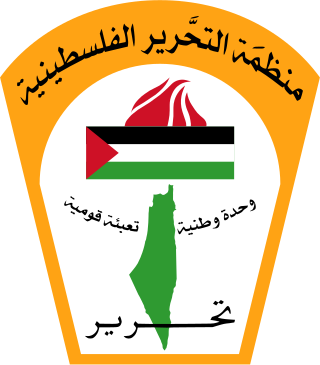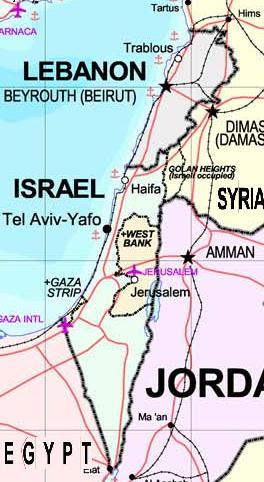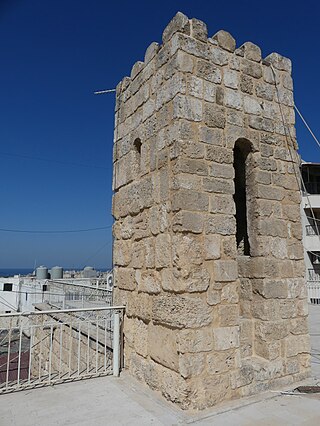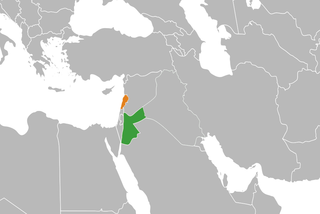
Palestinians are an Arab ethnonational group native to the region of Palestine.

The Palestine Liberation Organization is a Palestinian nationalist coalition that is internationally recognized as the official representative of the Palestinian people in both the Palestinian territories and the diaspora. It is currently represented by the Palestinian Authority based in the West Bank city of Al-Bireh.

The Israeli–Palestinian conflict is an ongoing military and political conflict about land and self-determination within the territory of the former Mandatory Palestine. Key aspects of the conflict include the Israeli occupation of the West Bank and Gaza Strip, the status of Jerusalem, Israeli settlements, borders, security, water rights, the permit regime, Palestinian freedom of movement, and the Palestinian right of return.
Palestinian refugees are citizens of Mandatory Palestine, and their descendants, who fled or were expelled from their country, village or house over the course of the 1948 Palestine war and during the 1967 Six-Day War. Most Palestinian refugees live in or near 68 Palestinian refugee camps across Jordan, Lebanon, Syria, the West Bank and the Gaza Strip. In 2019 more than 5.6 million Palestinian refugees were registered with the United Nations.

The 1982 Lebanon War, also called the Second Israeli invasion of Lebanon, began on 6 June 1982, when Israel invaded southern Lebanon. The invasion followed a series of attacks and counter-attacks between the Palestine Liberation Organization (PLO) operating in southern Lebanon and the Israeli military, which had caused civilian casualties on both sides of the border. The Israeli military operation, codenamed Operation Peace for Galilee, was launched after gunmen from the Abu Nidal Organization attempted to assassinate Shlomo Argov, Israel's ambassador to the United Kingdom. Israeli Prime Minister Menachem Begin blamed the PLO, using the incident as a casus belli. It was the second invasion of Lebanon by Israel, following the 1978 South Lebanon conflict.

Palestine, officially the State of Palestine, is a country in the southern Levant region of West Asia recognized by 146 out of 193 UN member states. It encompasses the Israeli-occupied West Bank, including East Jerusalem, and the Gaza Strip, collectively known as the occupied Palestinian territories, within the broader geographic and historical Palestine region. Palestine shares most of its borders with Israel, and it borders Jordan to the east and Egypt to the southwest. It has a total land area of 6,020 square kilometres (2,320 sq mi) while its population exceeds five million people. Its proclaimed capital is Jerusalem, while Ramallah serves as its administrative center. Gaza City was its largest city prior to evacuations in 2023.

The Lebanese Civil War was a multifaceted armed conflict that took place from 1975 to 1990. It resulted in an estimated 150,000 fatalities and led to the exodus of almost one million people from Lebanon.

The history of the Israeli–Palestinian conflict traces back to the late 19th century when Zionists sought to establish a homeland for the Jewish people in Ottoman-controlled Palestine, a region roughly corresponding to the Land of Israel in Jewish tradition. The Balfour Declaration of 1917, issued by the British government, endorsed the idea of a Jewish homeland in Palestine, which led to an influx of Jewish immigrants to the region. Following World War II and the Holocaust, international pressure mounted for the establishment of a Jewish state in Palestine, leading to the creation of Israel in 1948.
The Arab–Israeli conflict began in the 20th century, evolving from earlier Intercommunal violence in Mandatory Palestine. The conflict became a major international issue with the birth of Israel in 1948. The Arab–Israeli conflict has resulted in at least five major wars and a number of minor conflicts. It has also been the source of two major Palestinian uprisings (intifadas).

The Israeli–Lebanese conflict, or the South Lebanon conflict, is a long-running conflict involving Israel, Lebanon-based paramilitary groups, and sometimes Syria. The conflict peaked during the Lebanese Civil War. In response to Palestinian attacks from Lebanon, Israel invaded the country in 1978 and again in 1982. After this it occupied southern Lebanon until 2000, while fighting a guerrilla conflict against Shia paramilitaries. After Israel's withdrawal, Hezbollah attacks sparked the 2006 Lebanon War. A new period of conflict began in 2023, leading to the 2024 Israeli invasion of Lebanon.

Rashidieh, or Ar-Rashidiyah is the second most populous Palestinian refugee camp in Lebanon, located on the Mediterranean coast about five kilometres south of the city of Tyre (Sur).

The Arab–Israeli conflict is the phenomenon involving political tension, military conflicts, and other disputes between various Arab countries and Israel, which escalated during the 20th century. The roots of the Arab–Israeli conflict have been attributed to the support by Arab League member countries for the Palestinians, a fellow League member, in the ongoing Israeli–Palestinian conflict; this in turn has been attributed to the simultaneous rise of Zionism and Arab nationalism towards the end of the 19th century, though the two national movements had not clashed until the 1920s.
Palestinian people have a history that is often linked to the history of the Arab Nation. Upon the advent of Islam, Christianity was the major religion of Byzantine Palestine. Soon after the rise of Islam, Palestine was conquered and brought into the rapidly expanding Islamic empire. The Umayyad empire was the first of three successive dynasties to dominate the Arab-Islamic world and rule Palestine, followed by the Abbasids and the Fatimids. Muslim rule was briefly challenged and interrupted in parts of Palestine during the Crusades, but was restored under the Mamluks.

Palestinian fedayeen are militants or guerrillas of a nationalist orientation from among the Palestinian people. Most Palestinians consider the fedayeen to be freedom fighters, while most Israelis consider them to be terrorists.

Burj el-Shamali is a municipality located some 86 km south of Beirut and 3 km east of the Tyre/Sour peninsula, merging into its urban area. It is part of the Tyre Union of Municipalities within the Tyre District of the South Governorate of Lebanon.

Egypt–Palestine relations are the bilateral relations between the Arab Republic of Egypt and the State of Palestine. Egyptian President Gamal Abdel Nasser was a strong supporter of the Palestinian cause and he favored self-determination for the Palestinians. Although the Egyptian government has maintained a good relationship with Israel since the Camp David Accords, most Egyptians strongly resent Israel, and disapprove of the close relationship between the Israeli and Egyptian governments.

The Palestinian insurgency in South Lebanon was a multi-sided armed conflict initiated by the Palestinian Liberation Organization (PLO) against Israel in 1968 and against Lebanese Christian militias in the mid-1970s. PLO's goals evolved during the insurgency; by 1977, its goal was to pressure Israel into allowing a Palestinian state in the West Bank and Gaza Strip. In 1982, Israel invaded Lebanon and expelled the PLO, thereby ending the insurgency.

Al-Buss camp – also transliterated Bass, Al-Bass, or El-Buss with the definite article spelled either al or el – is one of the twelve Palestinian refugee camps in Lebanon, located in the Southern Lebanese city of Tyre. It had been a refuge for survivors of the Armenian genocide from the 1930s until the 1950s, built in a swamp area which during ancient times had for at least one and a half millennia been a necropolis. In recent decades it has been "at the center of Tyre’s experience with precarity" and "a space that feels permanent yet unfinished, suspended in time."

Palestinian nationalism is the national movement of the Palestinian people that espouses self-determination and sovereignty over the region of Palestine. Originally formed in the early 20th century in opposition to Zionism, Palestinian nationalism later internationalized and attached itself to other ideologies; it has thus rejected the occupation of the Palestinian territories by the government of Israel since the 1967 Six-Day War. Palestinian nationalists often draw upon broader political traditions in their ideology, such as Arab socialism and ethnic nationalism in the context of Muslim religious nationalism. Related beliefs have shaped the government of Palestine and continue to do so.

Jordanian–Lebanese relations is the relations between Jordan and Lebanon, two West Asian/Middle East Arab nations. Jordan has an embassy in Beirut and Lebanon has an embassy in Amman.















